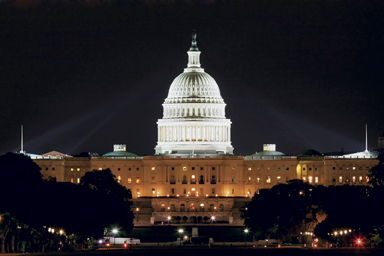Public Policy Analysis & Opinion
COMPETITION, INNOVATION, AND THE AHP
Do we want to be Pod People?
Sometimes I feel as if I live in that 1956 horror film and political commentary Invasion of the Body Snatchers. The film tells the tale of space-alien plant spores that land on Earth in the form of “pods.” Each of the pods proves capable of devouring humans who venture too close and reproducing a copy of a human being— minus reason and emotion. The replacement humans, or Pod People, urge the real humans to “just open the pod” and achieve a new level of contentment.
So if I open the “pod” that landed in my back yard overnight, everything will make sense? Remain calm. All is well. Just open the pod. Just do it. We could be living in what a Chinese curse called “interesting times” …
Before long, in some “competitive” state jurisdictions, an association executive could ask an administrative assistant to pick up a bubblegum wrapper off the ground, then offer the wrapper for sale as “a health insurance policy.” Yes friends, we are dealing in the dangerous realm of hyperbole here, but under the Trump administration’s proposed rules, no state official in the country will hold regulatory authority to stop this kind of deceptive sale. And this will drive some regulators to use the “desk-drawer rules” that industry advocates berate.
In my humble opinion, the pioneers in the new health insurance market would recognize and master the cherry picking, shell games, and other forms of “short cons” invited by the new Department of Labor rules.
Under the administration’s recommended general deregulation of the market, skilled agents and brokers who want to use their expertise to construct and offer a useful health insurance product—sometimes at greater expense—will “compete” with anything that a sponsor might call “health insurance.”
So, do we open the pod?
Sure, the “policy” formerly identified as a gum wrapper offers “materially lower” levels of risk transfer for financial losses arising from healthcare services and treatments. But what have transferring and spreading the risk of financial loss to do with anything? We are all about innovation!
Furthermore, please keep in mind that this new association policy will cost the lucky consumer nearly 20% less than policies that are compliant with the Affordable Care Act (ACA).
The massive cost savings to the consumer arise from the elimination of outrageous “bells and whistles” that burden those atavistic health insurance policies: outpatient services; emergency services; hospitalization; maternity and newborn care; mental health and substance abuse disorder services, including behavioral health treatment; prescription drugs; rehabilitative and habilitative services and devices (that help patients acquire, maintain, or improve skills necessary for daily functioning); laboratory services; preventive and wellness services and chronic disease management; and pediatric services, including oral and vision care.
In this competitive era, who even thinks of financial losses arising from those obnoxious bells and whistles? Who would characterize those elements as being vaguely related to healthcare? The pod can provide clarity where facts provide confusion.
Under modern and competitive Association Health Plans (AHPs), no one needs to pay for all that legal rubbish that no one ever really understood anyway! On top of that, a gum wrapper policy might come with a health-enhancing cartoon. Like Guinness, laughing is good for you!
Here in the AHP market, the consumer is king! Maybe someone wants to buy an affordable association policy, but that consumer also wants to demonstrate his or her commitment to faux ethnic diversity. Under the new competition-based framework, free from regulatory hindrances, association-based “innovators” could produce such a product, and nothing could stop an association from sponsoring an AHP based on discarded slips of paper found in fortune cookies!
Not only can this new tactic repurpose an otherwise trash bin-worthy slip of paper so the bearer can claim to have “health insurance,” but he or she gets a peek into the future! “You will become closely acquainted with a bankruptcy attorney.”
Sporty!
Perhaps now that we have accepted this approach to the problem of health insurance, we can employ this useful approach in other expensive sectors of the economy. Sadly, the insurance sector has not always been an ally of the competitive market movement.
Let’s start with automobiles. Recall that “Crazy Ralph” Nader made a bunch of noise concerning automobile “safety.” Nader vented his rhetorical spleen on the sporty Corvair, merely because that car had a tendency to flip over. Of course, the fact that Crazy Ralph probably still cannot grasp is that the “swing angle suspension” that tended to “tuck under” was one of the major reasons that happy customers called the car “sporty”! (At least the happy motorists who survived the crash and regained the ability to speak.)
Of course, the hair-shirt crowd started talking about regulation. Even insurance executives like John Fisher, the late CEO of the Nationwide Companies, made a big deal about requiring American automakers to put safety belts in the cars they built. Something about reducing the risk to drivers and passengers of being thrown through windshields and out the doors of vehicles during an accident? Someone must pay for bells and whistles like that, John!
What happened? The American automobile industry collapsed! However, we could rebuild the sector better, faster, “sportier.” Just get rid of all those burdensome safety requirements! Bring the cost of the average car down by at least 20%! America’s youth has no idea what kind of fun you can have when struck from behind in a Pinto! Why do we steal these experiences from America’s younger generation?
It wouldn’t surprise anyone if somebody had the foresight to buy up and stockpile Pinto parts. Let the market decide! No bureaucrat should mess with the fundamental freedom of the American car buyer to purchase a less expensive car just because it might become a flaming deathtrap.
Moreover, let’s just come right out and say it: The property/casualty actuaries—a recognized cult of troublemakers—should sit down and shut up! Those pencil-neck geeks have nitpicked the fun out of life.
They should learn from the folkways of the life and health actuaries, who begin every day with the knowledge that we are all going to die of something. There is a 100% chance of mortality, ladies and gentlemen—so quit raising the cost of my automobile!
Indeed, the automobile sector is not the only market that could benefit from the AHP “reforms.” The home chainsaw and table saw sectors present two examples of the heavy hand of Soviet-style regulation. Just think of the money consumers could save without manufacturers including those “com-symp” chain breaks in each and every unit! Even the price of saws that will never suffer a catastrophic failure or be misused by some yahoo operator must include the cost of “safety devices.”
Over the decades, Nervous Nellies have placed restrictions on good Americans who want to supplement their heating systems with add-on heaters that draw from large supplementary tanks of “petrochemical liquids.” Sure, from time to time these tanks might suffer a puncture or some other catastrophic failure that douses a house some with wickedly flammable liquid. People die. Those very same people made an economic decision based on their assets and priorities.
We should honor that decision-making process, shouldn’t we? Should we walk away from the fun and excitement that come with the peril of catastrophe?
Sir, I am an American. Where are my Lawn Darts? Thin the herd!
Science
When it comes down to brass tacks, this compulsion to identify, classify, and transfer risk is over-exercised. Just because an odd French priest with a gambling fixation named Blaise Pascal discovered a mathematical means to use evidence of past activity to predict future activity, why do we feel compelled to use that knowledge? Sometimes shiny paper and catchy names simply count for more in the marketplace than scientific analysis. If we did not already understand this fact, anyone who bought a real health insurance policy in a market where AHPs received equal treatment would come to that understanding very soon.
Anyone who cared about the scientific method would face a much-reduced number of choices in the “mart of commerce.” Who would advertise on cable television overnight or midday if consumers restricted their opportunities to things that worked?
Let us never forget that fraud provides the spice of economic life. If one could only assume that everything offered for sale worked as described, or did not result in injury, death, or financial loss, we would live in a dull world indeed!
Let us now praise famous frauds and cheap punk crooks who added excitement to our past: Carlos Miro, Mike Milken, Martin Frankel, and an unholy host of other Pod People. These pathfinders showed the way to today’s rejection of the scientific method and fact-based reality. Naturally, these con men came to the forefront ahead of their time, which resulted in their conviction and imprisonment. In my humble opinion, the pioneers in the new health insurance market would recognize and master the cherry-picking, shell games, and other forms of “short cons” invited by the new Department of Labor rules.
It’s time to lace up the cleats and run out on that new field of play. Yes, some Nanny States will throw impediments in the way of the free market! Take, for example, that left-wing haven of Louisiana (aka The People’s Republic of Lower Mississippi), which might require associations to operate for three years before issuing AHPs. When will these restraints on free peoples in the name of consumer protection come to an end?
BASTA! Stay away from the pods! It’s a trap!
The introduction of AHPs as a conduit for reduced-cost ersatz health insurance will not only harm those who buy the product. The presence of a commercial carcinogen in the market will place pressure on carriers and producers who want to market real insurance, which transfers and spreads the risk of financial loss. The AHPs will dumb down the scientific tenets of the business of insurance as well as diminish the public trust that makes the insurance mechanism work.
The author
Kevin P. Hennosy is an insurance writer who specializes in the history and politics of insurance regulation. He began his insurance career in the regulatory compliance office of Nationwide Insurance Cos. and then served as public affairs manager for the National Association of Insurance Commissioners (NAIC). Since leaving the NAIC staff, he has written extensively on insurance regulation and testified before the NAIC as a consumer advocate.






